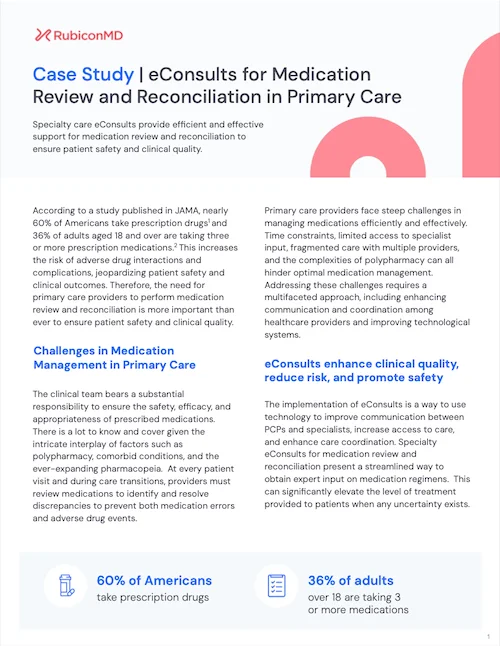How Virtual Specialists Help PACE Organizations Meet Regulatory Requirements
The Program of All-Inclusive Care for the Elderly (PACE) plays a vital role in helping older adults remain in their…
Primary care providers managing Medicare and Medicaid populations routinely care for patients with multiple chronic conditions, limited access to specialists, and significant social barriers. In fact, three in four adults enrolled in Medicaid report one or more chronic conditions. Adult enrollees with chronic conditions account for 69% of all spending for adult enrollees; this underscores the need for effective and early care interventions that can help avoid high-cost emergency visits, delayed diagnoses, and fragmented treatment.
eConsults are secure, virtual chats between PCPs and specialists that provide timely input on patient cases without requiring in-person referrals. For health systems and value-based organizations, eConsults are a cost-effective solution that helps close gaps and improve clinical decision-making. For providers, it’s like having a specialist by your side, when you need input.
Although Medicaid expansion in the US has increased potential access to routine primary care, it has also led to new challenges and health care disparities, chief among them access to high-quality specialty care.
For vulnerable populations—including low-income individuals, rural residents, and older adults—barriers to specialty care are systemic: limited availability, long wait times, lack of transportation, and narrow insurance networks. These patients often rely on emergency departments to fill gaps that could be avoided with timely specialist input. Research shows that eConsults reduce the need for in-person specialist visits by up to 70%, helping patients get the care they need faster and with fewer disruptions.
The average wait time for Medicare and Medicaid patients to see a specialist is 26 days, with some specialties having months-long waits. Many of these patients are burdened with access issues, whether due to disability, financial constraints, geographic proximity to care, or other challenges including immigration status. RubiconMD eConsult use cases demonstrate how high-quality virtual specialty care can help increase efficient and effective access to care:
Programs like PACE (Program of All-Inclusive Care for the Elderly), a CMS-recognized provider type, offer comprehensive care for frail geriatric patients. eConsults enhance these models by bringing specialists into the team virtually, allowing for quick adjustments to complex care plans. For CMS, this translates to cost savings; for patients, it means fewer unnecessary trips and safer care at home.
In value-based contracts (ACO REACH, MA, Medicaid managed care), reducing unnecessary utilization is a financial imperative. eConsults avoid low-value referrals, improve risk adjustment accuracy, and enhance coordination—all key levers for success.
Home-based healthcare providers shouldn’t have to manage complex cases alone. RubiconMD eConsults ensure that every provider has a team of specialists behind them, helping them deliver better, more confident care—without added costs or delays.
For organizations committed to improving home-based primary care, integrating eConsults is a game-changer. It’s a simple yet powerful way to enhance care quality, lower costs, and support providers in delivering the best possible outcomes for their patients.
To make the most of eConsults, home-based providers should:
eConsults offer clear ROI: Faster access to specialty input, fewer unnecessary referrals, and lower costs for Medicare and Medicaid populations. One study showed Medicaid patients with eConsults had average specialty-related care costs of $82 per patient per month less than those sent directly for in-person referrals. eConsults provide a mechanism for specialists to provide guidance for patients to be safely treated in primary care, improving clinical decision-making and supporting better outcomes in value-based care models.
With the threat of massive cuts to Medicaid and potential ripple effects to the Medicare program and its beneficiaries, adopting new programs such as virtual specialty care, may give reason for pause, especially in fee-for service environments. Fortunately, more states and plans are beginning to recognize and pay for eConsults; this effectively enhances specialty care access for the most vulnerable populations.
eConsults are a practical solution for making specialty care more equitable, timely, and affordable. For the broad expanse of Medicare and Medicaid populations facing access challenges, virtual specialty insights can be the difference between proactive care and avoidable deterioration. For healthcare leaders, the ROI is compelling. eConsults enhance access, reduce costs, and help deliver timely, equitable care. PCPs can rely on eConsults as a smart investment that supports the transition to more effective value-based healthcare.
To learn more about virtual specialty care solutions, schedule a demo today.
The Program of All-Inclusive Care for the Elderly (PACE) plays a vital role in helping older adults remain in their…
By Dr. Mickey Lui, DO, MPH, presented as a RubiconMD CME Webinar Access to timely, high-quality orthopedic care remains a…
In January, we outlined the top trends set to shape primary care in 2025, with a focus on how eConsults…

Explore real examples of specialty care eConsults providing efficient and effective support for medication review and reconciliation.